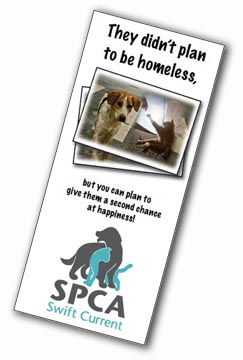Feral or wild cats have been reported to us from all over the Southwest. Many people have wished to catch and surrender them to us but we cannot accept feral cats into our Shelter. Feral cats frequently carry diseases which can be highly transmissable to other cats which would place our Shelter cats at risk. This summer we experienced an outbreak of panleukopenia (kitty parvo) which we suspect was responsible for the death of 10 kittens here at the Shelter. Two of these kittens were wild ones that were caught and tamed but likely brought diisease with them. Many feline diseases are transmissable through sneezing, coughing and contact with fecal matter. Due to the high risk to our Shelter population we ask that people do not attempt to surrender any wild cats or kittens to us. As well as the risk of disease to our animals we cannot take the risk of handling wild cats on a daily basis as we have to move each cat to a different kennel to properly clean each kennel. Handling wild cats in such a close environment presents a high possibility of bites and scratches to be inflicted on our staff. If you choose to trap or catch feral or wild cats please understand that the onus is on you to find homes for these felines.
SPCA
Swift Current
© 2024 SPCAWHC2
Theme by Anders Noren — Up ↑



December 5, 2009 at 5:23 am
And Feral kitties are tough to catch in the first place!
On another note: Yay Kenna got adopted:D I want Gunner:D But still no pets for us yet:(
January 1, 2010 at 1:25 pm
So all the feral cats out there are just suppose to freeze, or starve to death? Who is responsible for their lives? Why is the Swift Current SPCA not willing to help those who are truly in the most need?
January 3, 2010 at 1:48 pm
(completed from above) Although the plight of feral cats is very sad, we simply cannot put the tame cats we have here at the Shelter at risk of contracting disease nor put our Staff members at risk of injury when daily working with these wild cats. Feral cat populations carry diseases like upper respiratory infections, kitty parvo, kitty AIDS and other contagious infections. If the Shelter cats become infected in epidemic proportions it is simply not feasible to attempt to treat them all and realistically they may be left with lifelong illness even with treatment. Our policy came into effect following a citizen of Swift Current, believing to be doing the right thing, brought a feral kitten into us to care for. As it turned out this kitten was infected with panleukopenia (also known as kitty parvo) and died. This was not the end of it however as that one kitten spread the infection through the Shelter. As a result 12 very cute, friendly and highly adoptable kittens died from kitty parvo. Was this fair to these once healthy kittens who missed out on forever homes? We have received many calls regarding the feral cat populations in surrounding communities with concerns about the health and welfare of these ferals and about the health and welfare of other animals in the communities. As this is happening everywhere we believe that each community must come to a decision as to what their solutions must be. Discussing this with mayors, council members, reeves and any other community leaders may lead to solutions. Although we receive donations from several other surrounding centers, these donations would in no way be enough to cover all of the vet bills incurred with caring for the health issues of feral cat populations. Some communities’ solutions have feral cat spay and neuter programs where the populations are controlled via sterilizing the captured cats and releasing them back into their respective communities. A recent phone call from a community close to Swift Current indicated that there were at least 40 adult feral cats in that small town. What many people do not realize is that we only have room for 47 adult cats. We are attempting to be a low-kill shelter meaning that we do not euthanize for space, only due to severe aggression or illness. Please understand that we find the feral cat population explosions to be disturbing but our position is that each community mustfind their own solutions to deal with their feral cat issues.